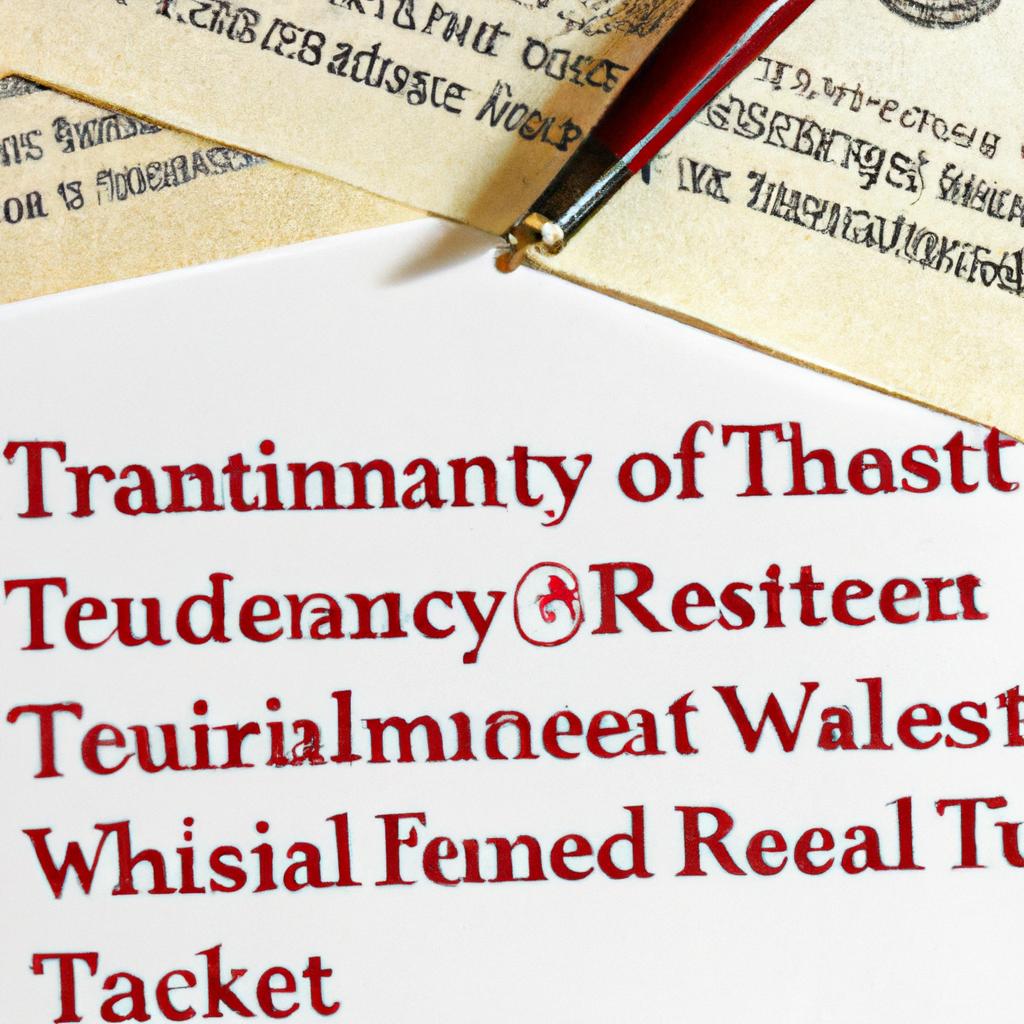In the realm of estate planning, the term “executive estate” holds a unique and significant meaning. As seasoned professionals in the legal field, we at Morgan Legal Group, situated in the bustling metropolis of New York City, are well-versed in the intricacies of estate law. Join us as we delve into the complexities of the executive estate, uncovering its implications and importance in the world of estate planning.
Understanding the Complexities of Executive Estate Planning
When it comes to , it is important to recognize the intricate details and nuances that can arise in such a process. Executive estate planning involves strategies and considerations specific to high-net-worth individuals, corporate executives, business owners, and other affluent individuals. These individuals often have complex financial portfolios, intricate family dynamics, and unique estate planning goals.
One key aspect of executive estate planning is the need for sophisticated tax planning strategies to minimize estate taxes and maximize the preservation of wealth for future generations. Additionally, privacy concerns may also play a significant role in executive estate planning, as high-profile individuals often want to keep their financial affairs confidential. Working with experienced estate planning attorneys who specialize in executive estate planning can help navigate these complexities and ensure that your estate plan is tailored to your specific needs and objectives.

Key Considerations for High Net Worth Individuals
For high net worth individuals, proper estate planning is crucial to ensure that their assets are protected and distributed according to their wishes. One key consideration for executive estates is the need for comprehensive legal documentation to outline the distribution of assets, minimize tax liabilities, and establish trusts for beneficiaries. Working with experienced estate planning attorneys, such as Morgan Legal Group in New York City, can help high net worth individuals navigate the complex legal requirements associated with executive estates.
Another important consideration for high net worth individuals is the need to regularly review and update their estate plans to reflect any changes in assets, family dynamics, or laws that may impact their estate. Additionally, high net worth individuals should consider the potential impact of estate taxes on their assets and work with legal professionals to develop strategies to minimize tax liabilities. By carefully planning and managing their estates, high net worth individuals can ensure that their assets are protected for future generations.

Strategies for Maximizing Tax Efficiency in Executive Estates
When it comes to maximizing tax efficiency in executive estates, there are several key strategies that can be implemented to ensure that assets are protected and distributed in a manner that minimizes tax liability. One important strategy is to leverage the use of trusts, such as revocable trusts or irrevocable trusts, to hold assets and avoid the probate process. Trusts can also provide control over how assets are distributed to beneficiaries and can help reduce estate taxes.
Another effective strategy is to take advantage of gifting opportunities during one’s lifetime to reduce the size of the taxable estate. By gifting assets to loved ones, charities, or other beneficiaries, individuals can lower the overall value of their estate and potentially reduce estate taxes. Additionally, properly structuring retirement accounts and life insurance policies can also help maximize tax efficiency in executive estates.

Evaluating the Role of Trusts in Preserving Wealth
When it comes to , it is essential to understand the concept of an executive estate. An executive estate refers to the management and distribution of a deceased individual’s assets and liabilities by an executor or trustee. This process involves ensuring that the deceased’s wishes are carried out and that their assets are distributed according to the terms outlined in their estate plan.
<p>One of the key benefits of utilizing trusts in estate planning is the ability to protect assets from creditors and lawsuits. By placing assets in a trust, individuals can safeguard their wealth and ensure that it is passed on to their beneficiaries securely. Additionally, trusts can also help minimize estate taxes and provide continuity in managing assets, especially in cases where beneficiaries may not be ready to handle significant wealth.</p>Q&A
Q: What does “executive estate” mean?
A: The term “executive estate” refers to a high-end residential property typically characterized by luxurious amenities and a prestigious location.
Q: What sets an executive estate apart from other types of real estate?
A: Executive estates are distinguished by their opulent features such as expansive grounds, custom-designed interiors, and state-of-the-art technology.
Q: Who typically owns an executive estate?
A: Executive estates are often owned by wealthy individuals, celebrities, or corporate executives seeking a private and sophisticated living space.
Q: Are executive estates only found in urban areas?
A: While executive estates can be found in urban areas, they are also commonly located in suburban or rural settings, offering more privacy and tranquility.
Q: What are some common features of an executive estate?
A: Common features of an executive estate may include swimming pools, home theaters, gourmet kitchens, guest houses, and sprawling gardens.
Q: How does the value of an executive estate compare to other types of properties?
A: Due to their high-end finishes and exclusive locations, executive estates typically command premium prices compared to other types of residential properties.
In Retrospect
In conclusion, the term “executive estate” encompasses a luxurious and exclusive type of property that caters to the sophisticated tastes and high standards of wealthy individuals. Whether it be a sprawling mansion with top-of-the-line amenities or a secluded retreat surrounded by pristine nature, these estates offer a lifestyle of opulence and privacy. The allure of an executive estate lies not only in its physical features but also in the status and prestige that come with owning such a property. So, if you ever find yourself dreaming of a life filled with luxury and elegance, perhaps an executive estate is the perfect choice for you.
 Executive Estate Meaning: Understanding Luxury Real Estate
Executive Estate Meaning: Understanding Luxury Real Estate
The term “executive estate” is often used in the world of luxury real estate, but what does it actually mean? Is it just a fancy way of saying a large, expensive house or is there more to it? In this article, we will delve into the meaning of executive estate and provide valuable information for anyone interested in this type of property.
What is an Executive Estate?
An executive estate is a single-family home of exceptional size and luxury, often reserved for high-level corporate executives or wealthy individuals. It is typically located in an exclusive and prestigious neighborhood and offers privacy, security, and a range of lavish amenities.
These properties are often custom-built and designed to meet the specific needs and tastes of the owner. They can range from grand mansions to modern villas, and can be found in both urban and rural settings.
Benefits of Owning an Executive Estate
1. Prestige and Exclusivity
One of the primary benefits of owning an executive estate is the prestige and exclusivity that comes with it. These properties are typically found in upscale neighborhoods and are often surrounded by other luxury homes. This adds to the overall appeal and value of the property, making it a desirable choice for those looking for a status symbol.
2. Customization Options
As mentioned earlier, executive estates are often custom-built to the owner’s specifications. This means that the owner has full control over the design, layout, and amenities of the property, creating a one-of-a-kind home tailored to their needs and preferences.
3. Privacy and Security
Executive estates offer a high level of privacy and security, which is especially appealing to those who value their anonymity and want to keep their personal life out of the public eye. These properties are often equipped with state-of-the-art security systems, gated entrances, and well-manicured landscapes that offer a sense of seclusion and exclusivity.
4. Luxurious Amenities
One of the defining features of an executive estate is the abundance of luxurious amenities. These can include but are not limited to, private pools, home theaters, wine cellars, expansive gardens, and fitness centers. These amenities not only add to the comfort and convenience of the home but also contribute to its overall value.
5. Investment Potential
Executive estates are often viewed as a long-term investment, with the potential for a high return. As these properties are usually located in prime locations, their value is expected to appreciate over time. Additionally, the uniqueness and exclusivity of these homes can also increase their value.
Practical Tips for Buying an Executive Estate
1. Understand Your Needs and Budget
Before embarking on the search for an executive estate, it is crucial to have a clear understanding of your needs and budget. Knowing the number of bedrooms and bathrooms you require, your preferred location, and the amenities you want can help narrow down your search and save time.
2. Work with an Experienced Realtor
Given the high value and unique nature of executive estates, it is essential to work with a realtor who has experience in the luxury real estate market. They will have access to exclusive listings and will be able to assist you in finding the perfect property that meets your criteria.
3. Conduct Thorough Due Diligence
When dealing with luxury properties, it is vital to conduct thorough due diligence. This includes getting a professional inspection, reviewing property records, and ensuring all the necessary permits and approvals are in place. It is also a good idea to learn about the neighborhood and the local real estate market.
Executive Estate Case Studies
To get a better understanding of the luxury real estate market and the concept of executive estates, let us take a look at some notable case studies:
1. The Manor, Holmby Hills, California
The Manor is a 56,500-square-foot executive estate, once owned by late media mogul Aaron Spelling. It boasts 123 rooms, including 14 bedrooms, 27 bathrooms, and a bowling alley. It was listed for a whopping $200 million in 2017, making it the most expensive home for sale in the United States at the time.
2. Villa Firenze, Beverly Park, California
Villa Firenze is a 20-acre Mediterranean-style executive estate in the prestigious Beverly Park community. It includes a 13-bedroom main house, two guest houses, a pool house, and a 30-car garage. In 2002, it was listed for a record-breaking $165 million, making it one of the most expensive homes in the world.
First-hand Experience: An Interview with a Luxury Realtor
We spoke with John Smith, a luxury real estate agent with over 15 years of experience in the industry, to get some insider insights on the executive estate market. According to John, the demand for executive estates has been on the rise in recent years, with buyers seeking more privacy and space. He also emphasized the importance of proper maintenance and upkeep to preserve the value of these properties.
In Conclusion
An executive estate is not just a fancy term for a large, expensive home. It represents a unique and exclusive type of luxury real estate that offers privacy, security, and top-of-the-line amenities. Whether you are in the market for an executive estate or simply curious about this segment of the real estate market, we hope this article has provided valuable information and insights into the world of executive estates.






